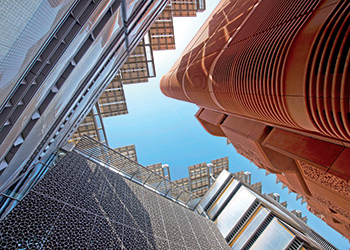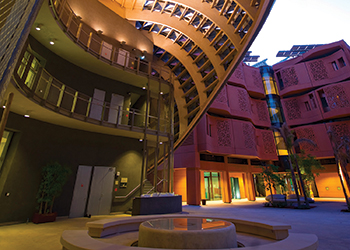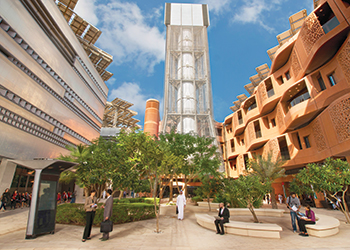Masdar City green footprint to expand
01 June 2016
Having received approvals for its second and fifth phases, Masdar City is set for significant expansion. Targeting Four Pearl Estidama Community Rating, the development also aims to become a hub for green research.
Abu Dhabi’s Masdar City, which is the first development in the UAE to target a Four Pearl Estidama Community Rating, is expected to undergo significant expansion over the next five years as it enhances its status as a hub for research and development (R&D) and the commercialisation of clean technologies.
Dubbed as one of the world’s most sustainable urban developments, Masdar City marked key milestones recently in line with its aspirations to set the benchmarks for sustainability in the region as well as worldwide: The city received the go-ahead from Abu Dhabi’s Urban Planning Council (UPC) for the detailed masterplans for its second and fifth phases. Covering 995,000 sq m, Phase Two will have a dedicated R&D cluster and incorporate the city’s first residential neighbourhood while Phase Five will see the construction of hundreds of villas and townhouses as well as recreational facilities and green open spaces.
Anthony Mallows, the executive director at Masdar City, comments: “Obtaining the UPC approval of the detailed masterplans opens the way for the future ambitious expansion of Masdar City, and is further evidence of our commitment to realise the world’s most sustainable urban development.”
“Masdar City aspires to be a model for the way our cities are built in the future, setting new standards for reducing energy and water demand, waste and carbon emissions. We look forward to becoming the first development in the UAE to achieve the Four Pearl Estidama Community Rating, working in partnership with the UPC.”
Estidama, which means ‘sustainability’ in Arabic, is a UPC initiative aimed at transforming Abu Dhabi into a model for sustainable environmental, economic, social and cultural urbanisation. The Estidama Pearl Community Rating System (PCRS) promotes the development of complete sustainable communities. Maximising water and energy efficiency, reducing waste, and using locally sourced building materials are priorities – both to reduce the environmental impact of urbanisation and to improve the overall supply chain for sustainable products and services.
Masdar City also marked the launch of construction work on Leonardo Residences which forms part of its Phase Two development. The 170-unit development is the first project of Abu Dhabi-based property developer Reportage Real Estate, a third-party investor in the city.
Leonardo Residences comprises one-, two- and three-bedroom private apartments that will go up within the existing footprint of Masdar City, within walking distance from the Masdar Institute of Science and Technology, the headquarters of the International Renewable Energy Agency (Irena), and the multinational companies anchoring the development.
The residential development will achieve a minimum ‘Three Pearl’ Estidama rating, and each home buyer will receive a certificate when the apartments are handed over.
“The official start of construction of Leonardo Residences is another milestone in the realisation of the world’s most sustainable urban development, and further evidence of the construction progress happening all around the city,” says Mohamed Al Ramahi, chief executive officer of Masdar.
Located outside Abu Dhabi over a site area of more than 6 million sq m, Masdar City is a low-carbon and pedestrian-focused innovation community designed to encourage creativity and collaboration in the midst of one of the world’s harshest climates. The city is only 20 minutes from downtown Abu Dhabi, five minutes from Abu Dhabi International Airport and 40 minutes from Dubai.
At the city’s core is the Masdar Institute of Science and Technology, an institution integral to the growth of the UAE’s knowledge-based economy. Other key buildings include Siemens Middle East headquarters, designed with sustainable materials and energy-efficient technologies, making it the first, and currently the only Three Pearl Estidama and Leed (Leadership in Energy and Environmental Design) Platinum-certified office building in Abu Dhabi; and Irena headquarters, the UAE’s first Four Pearl structure under the Estidama Pearl Building Rating System.
Buildings in Masdar City are constructed with 90 per cent recycled aluminium and low-carbon cement, in addition to other locally-sourced and verified materials; and must meet a minimum Three Pearl Estidama rating (comparable to Leed Gold). The city integrates a smart network of transportation options to create an accessible, liveable community.
Residences at Masdar City are expected to be built largely to accommodate those working at the site’s dedicated research and development cluster.
 |
|
Buildings in Masdar City are constructed with 90 per cent recycled aluminium and low-carbon cement. |
“About 35 per cent of the planned built-up area will be completed over the next five years – up from five per cent today – and nearly 30 per cent has been committed to, including private homes, schools, hotels and more office space,” says Mallows. “Masdar City’s expansion is gathering pace because today we are recognised as an innovation ecosystem – a hub for R&D, technology, human capital building, business opportunity and investment.”
Phase Two will contain around 2,000 residential apartments in more than 25 buildings clustered around a wide range of entertainment options, retail outlets, restaurants, cafés and community services. These amenities will be linked by a network of pedestrian connections and will be located within walking distance of a number of Masdar City’s flagship R&D and pilot projects. The detailed masterplan for Phase Two drawn up by CBT Architects recently won the American Institute of Architects Middle East’s Design Award in recognition of its leadership in design excellence, urban design and planning.
Approved in record time and with the resounding support of the Abu Dhabi Urban Planning Council, this forward-thinking plan is said to “take a fresh look at urban sustainability to create a welcoming and walkable city in the midst of one of the world’s harshest climates.”
The entire phase will be enriched with beautiful open green spaces and connect all the communities within it.
Meanwhile, the R&D cluster is at the heart of Masdar City’s focus on driving innovation in clean technologies and sustainable development. The Masdar Institute of Science and Technology is leading knowledge creation and research within the cluster in combination with applied research, development and pilot facilities that are exploring the technical and commercial viability of the new various applications being studied.
The research, development and pilot facilities within Phase Two include Masdar Solar Hub (photovoltaic test centre); Masdar Solar Hub (CPV testing facility); Electric Energy Storage Solutions Hub; Eco-Villa Prototype; Smart Home Energy Management System (SHEMS) for Eco-Villa; Masdar Institute for Science and Technology Field Station; and Feasibility of District Cooling Powered by Geothermal Energy.
“Masdar City is a template for sustainable urban development, and its evolution is taking place in partnership with a growing community of developers, investors and private sector companies,” Mallows comments. “This community is actively contributing to and benefiting from the sustainable building practices and advanced technologies deployed in the realisation of the city, whether it’s the application of renewable energy, energy- and water-saving processes, or the use of low-carbon cement and recycled metals.
“At the same time, Masdar City is raising the bar for sustainable urban development through the various R&D initiatives and demonstration projects active on site, such as the Eco-Villa Prototype now under construction.”
The four-bedroom project with a gross floor area of 405 sq m incorporates innovative water- and energy-saving technologies and design features that significantly reduce its environmental impact compared to existing villas. The Eco-Villa Prototype is designed to use 72 per cent less energy and 35 per cent less water than existing villas in Abu Dhabi, and can even export power to the national grid when equipped with rooftop photovoltaic (PV) solar panels. The prototype is designed to displace up to 63 tonnes of carbon emissions each year.
The ‘Net Zero Energy’ version of the prototype equipped with 80 rooftop PV panels can supply up to 40,000 kWh per year to the national grid, easily offsetting its own electricity requirements.
The SHEMS research project led by the Masdar Institute is currently testing ‘intelligent’ IT systems to manage energy consumption more efficiently within the Eco-Villa Prototype, and potentially other buildings at Masdar City.
 |
|
Masdar City is recognised as a hub for R&D. |
Masdar and Masdar Institute specialists are also studying energy-efficient indoor climate control technologies, known as variable refrigerant flow (VRF) systems, for the Eco-Villa project and other residential and commercial real estate.
Elsewhere in the R&D cluster, the electric energy storage solutions hub is exploring the potential of electrochemical technologies (Redox Flow Batteries) to enhance the capacity of renewable energy systems to store power, enabling their wider adoption in the energy mix.
Another trailblazing project is evaluating geothermal energy as a possible power source for district cooling. With geothermal wells already sunk to a depth of 2,500 m within the grounds of Masdar City, the research initiative is the first of its type in the Middle East and may be converted into a full-fledged demonstration project.
A purpose-built facility at Masdar City is promoting the reuse and recycling of construction waste, while another Masdar initiative, The Future Build, is enabling architects, developers and contractors to source sustainable building products and materials more easily through a dedicated portal.
Around 300 products were added to the website last year, nearly doubling the service’s existing inventory. In partnership with the Abu Dhabi Quality and Conformity Council, The Future Build aims to create the UAE’s largest database of independently certified products complying with the Estidama Pearl Rating System and other green building rating systems.
As part of its expansion plan, Masdar City aims to grow its commercial tenant base nearly fourfold by 2020, and to expand the net leasable area available within its free zone by around a third (32 per cent) every year over the next four years.
New office real estate in the pipeline will address the market demand for space.
Offering 16,634 sq m of gross floor area (GFA), a six-floor multi-tenant office block will be delivered by the end of next year within the existing first phase of the development by UAE-based Tristar Real Estate.
Meanwhile, the Accelerator One building, being built by Masdar as part of the dedicated R&D cluster planned for Phase Two, is due for completion by the second quarter of 2017. The building will also achieve a Three Pearl Estidama rating, and realise 85 per cent space efficiency.
The city is also helping the Middle East’s real estate industry to acquire valuable green building expertise as it continues to expand.
More than a third of its planned built-up area will be completed within the next five years, a significant proportion of it by third-party developers whose projects will be realised according to stringent environmental standards.
Third-party developments include Tristar Real Estate’s six-floor office block and upscale private apartments and townhouses. A new campus of Emirates College of Technology, the Abu Dhabi-based private higher education institution, and a new GEMS Education school are also among the third-party projects planned.
These and other developments will meet a minimum Three Pearl Estidama rating, meaning they will be designed to be up to 40 per cent more water- and energy-efficient than comparable existing buildings, while also using more environment-friendly materials in their construction.
The Masdar City campus of the Emirates College of Technology aims to incorporate robotic parking technology to maximise the efficient use of space, widening the adoption of architectural and civil engineering innovation in the region.
“This year marks Masdar’s 10th anniversary and the continued evolution of the city is helping us to deliver on our goal for the next decade: to make clean energy an essential part of the energy mix worldwide,” adds Mallows. “By making clean energy commercially viable, we help preserve the planet, inspire innovation and new industries, and diversify the UAE economy and economies around the world.”
When complete, up to 40,000 people will live in Masdar City, with up to 50,000 working and studying there every day.
- Masdar City green footprint to expand
- Hilton Garden Inn Leeds with green credentials
- Effective insulation key to environmental gains
- Kingspan uses blowing agent with zero ODP
- Unigulf promotes Oriform’s benefits
- Bahrain working on 40 ‘green’ building projects
- Magic Dow fluid captures solar energy



